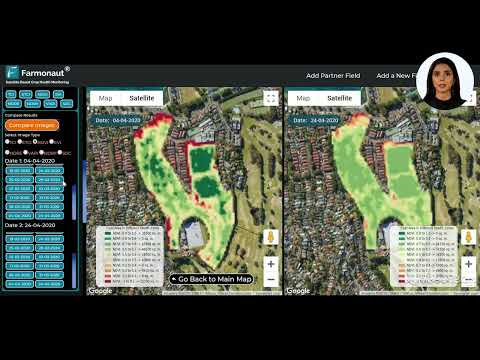East Coast Port Strike Resolution: Impact on US Agriculture and Farm Equipment Supply Chains
“The recent East Coast dockworkers’ strike suspension affected over 70% of US agricultural exports through Atlantic ports.”
In the ever-evolving landscape of US agriculture, recent events have brought significant challenges and opportunities to the forefront. The resolution of the East Coast port strike has sent ripples through the farming industry, affecting everything from farm equipment supply chains to agricultural export trends. As we navigate these changes, it’s crucial to understand the broader implications for farmers, agribusinesses, and the entire agricultural sector.
At Farmonaut, we’re committed to providing cutting-edge solutions that help farmers adapt to these dynamic conditions. Our satellite-based farm management platform offers real-time insights that are more valuable than ever in these uncertain times.

The East Coast Port Strike: A Brief Overview
The recent labor dispute at East Coast ports brought to light the critical role that dockworkers play in the agricultural supply chain. This strike, which threatened to disrupt the flow of goods in and out of major Atlantic ports, had the potential to cause significant delays in the shipment of agricultural products and farm equipment.
- Impact on exports: The strike affected the movement of key agricultural commodities, including grain, cotton, and livestock feed.
- Equipment delays: Importation of essential farming machinery and parts faced potential setbacks.
- Market uncertainty: The situation created volatility in agricultural futures markets.
The resolution of this strike has brought relief to many in the agricultural sector, but its effects continue to reverberate through the industry.
Implications for Agricultural Export Trends
The suspension of the East Coast port strike has significant implications for agricultural export trends. As operations resume, we’re seeing a gradual return to normalcy in the export of key commodities:
- Grain exports: Wheat, corn, and soybean shipments are expected to pick up pace, potentially leading to improved market prices for farmers.
- Cotton trade: The textile industry, heavily reliant on cotton exports, is likely to see smoother operations in the coming months.
- Specialty crops: Exporters of fruits, vegetables, and other perishables can now breathe easier with reduced risk of spoilage due to shipping delays.
However, the aftermath of the strike may lead to short-term congestion at ports as backlogged shipments are processed. Farmers and exporters should be prepared for potential delays as the system catches up.
Farm Equipment Supply Chain Impacts
The resolution of the port strike is expected to have a positive impact on the farm equipment supply chain. Many farmers have been facing challenges in acquiring new machinery or replacement parts due to shipping delays. With port operations resuming, we anticipate:
- Faster delivery of imported farm equipment and parts
- Potential reduction in equipment costs as supply stabilizes
- Improved availability of precision agriculture tools and technologies
At Farmonaut, we understand the importance of having the right tools at the right time. Our satellite-based crop monitoring system can help farmers optimize their existing equipment usage while they wait for new machinery to arrive.
Precision Agriculture Advancements
“Precision agriculture technologies can increase crop yields by up to 30% while reducing water usage by 20-50%.”
As we move beyond the immediate concerns of the port strike, it’s important to focus on the ongoing advancements in precision agriculture. These technologies are revolutionizing farming practices and improving efficiency across the board:
- Satellite imagery: Real-time crop health monitoring allows for targeted interventions.
- AI-driven analytics: Predictive models help farmers make data-driven decisions.
- IoT sensors: Connected devices provide granular data on soil conditions and crop growth.
Farmonaut’s platform integrates these advanced technologies to provide farmers with actionable insights. Our API allows for seamless integration with other farm management tools, creating a comprehensive precision agriculture ecosystem.

Smart Farming Solar Innovations
The intersection of smart farming and solar energy is creating exciting opportunities for sustainable agriculture. As the industry recovers from the port strike disruptions, we’re seeing increased interest in solar-powered farming solutions:
- Solar-powered irrigation systems
- Off-grid farm equipment charging stations
- Photovoltaic greenhouses for year-round crop production
These innovations not only reduce operational costs for farmers but also contribute to more sustainable farming practices. Farmonaut’s platform can help farmers monitor the effectiveness of these solar innovations by providing detailed data on crop performance and resource utilization.
US Wheat Production Forecast
The resolution of the East Coast port strike comes at a crucial time for US wheat producers. The latest forecast for US wheat production indicates:
- A slight increase in overall production compared to last year
- Regional variations due to weather conditions and water availability
- Potential for improved export opportunities with port operations normalized
Wheat farmers can leverage Farmonaut’s crop monitoring tools to optimize their production and align with market demands. Our platform provides valuable insights into crop health, helping farmers make informed decisions about irrigation, fertilization, and harvest timing.
GIS Applications in Agriculture
Geographic Information Systems (GIS) continue to play a crucial role in modern agriculture. In the context of recovering from supply chain disruptions, GIS applications offer several benefits:
- Optimizing transportation routes for agricultural products
- Mapping and analyzing crop yield data
- Monitoring land use changes and their impact on agriculture
Farmonaut integrates GIS technology into our platform, allowing farmers to visualize and analyze spatial data related to their crops. This capability is particularly valuable as the industry adapts to new supply chain realities post-strike.
Irrigation and Pest Management in Crop Quality
As the agricultural sector rebounds from the port strike, maintaining crop quality through effective irrigation and pest management becomes even more critical. Farmers are focusing on:
- Precision irrigation techniques to conserve water and improve yield
- Integrated pest management strategies to reduce chemical usage
- Early detection of crop diseases through advanced monitoring
Farmonaut’s satellite-based monitoring system helps farmers identify potential irrigation issues or pest infestations early, allowing for timely interventions that preserve crop quality and yield.
The Role of Technology in Agricultural Labor Disputes
The recent East Coast port strike highlights the ongoing challenges related to agricultural labor disputes. Technology is playing an increasingly important role in addressing these issues:
- Automation reducing dependence on manual labor in certain areas
- Remote monitoring systems improving working conditions and safety
- Data-driven decision-making leading to more efficient resource allocation
While technology cannot completely eliminate labor disputes, it can help create more sustainable and equitable working conditions in the agricultural sector. Farmonaut’s platform contributes to this goal by providing tools that increase efficiency and reduce the physical demands of farming.
Impact on Rural Production and Market Stability
The resolution of the East Coast port strike has far-reaching implications for rural production and overall market stability in the agricultural sector:
- Improved export opportunities may lead to increased rural production
- Stabilizing prices for agricultural commodities as supply chains normalize
- Potential for new investments in rural infrastructure to support increased production
Farmers can use Farmonaut’s analytics tools to track market trends and adjust their production strategies accordingly, helping to maintain stability in this evolving landscape.
The Future of Farming: Innovations and Challenges
As we look beyond the immediate impacts of the port strike resolution, it’s clear that the future of farming will be shaped by ongoing innovations and challenges:
- Climate change adaptation strategies
- Blockchain technology for improved supply chain transparency
- Vertical farming and urban agriculture initiatives
- Genetic engineering for crop resilience and yield improvement
Farmonaut is committed to staying at the forefront of these innovations, continually updating our platform to provide farmers with the most advanced tools and insights available.
Comparative Analysis: Impact of East Coast Port Strike Resolution
| Agricultural Sector | Pre-Resolution Impact | Post-Resolution Outlook | Long-term Implications |
|---|---|---|---|
| Grain Exports | Significant delays, potential spoilage | Rapid recovery, increased shipments | Enhanced export competitiveness |
| Farm Equipment Supply | Shortages, increased costs | Improved availability, stabilizing prices | Accelerated adoption of new technologies |
| Perishable Goods | High risk of losses, market instability | Quick resumption of exports, price stabilization | Investment in advanced preservation technologies |
| Livestock Feed | Supply chain disruptions, price volatility | Normalized supply, gradual price adjustments | Increased focus on domestic feed production |
Conclusion: Navigating the Post-Strike Agricultural Landscape
The resolution of the East Coast port strike marks a significant turning point for US agriculture and farm equipment supply chains. As the industry adapts to these changes, the importance of technology, data-driven decision-making, and sustainable practices becomes ever more apparent.
At Farmonaut, we’re dedicated to supporting farmers and agribusinesses through these transitions. Our advanced satellite-based monitoring system, AI-driven analytics, and comprehensive farm management tools are designed to help agricultural professionals thrive in this dynamic environment.
As we move forward, the resilience and innovation demonstrated by the agricultural sector in response to these challenges will undoubtedly shape the future of farming. By embracing new technologies and sustainable practices, we can build a more robust, efficient, and productive agricultural industry for generations to come.
Farmonaut Subscriptions
Frequently Asked Questions
Q: How did the East Coast port strike affect agricultural exports?
A: The strike caused significant delays in shipping agricultural products, potentially leading to spoilage of perishable goods and disrupting supply chains for various commodities.
Q: What impact did the strike resolution have on farm equipment supply?
A: The resolution is expected to improve the availability of imported farm equipment and parts, potentially leading to more stable prices and faster delivery times.
Q: How can farmers adapt to the changing agricultural landscape post-strike?
A: Farmers can leverage technology like Farmonaut’s satellite-based monitoring system to optimize their operations, make data-driven decisions, and stay competitive in the evolving market.
Q: What role does precision agriculture play in addressing challenges like supply chain disruptions?
A: Precision agriculture technologies help farmers optimize resource use, improve crop yields, and make more informed decisions, which can mitigate the impacts of supply chain disruptions.
Q: How can Farmonaut’s platform help farmers in the post-strike environment?
A: Farmonaut provides real-time crop monitoring, AI-driven analytics, and farm management tools that help farmers adapt to changing market conditions and optimize their operations for maximum efficiency and profitability.
For more information on how Farmonaut can help you navigate the evolving agricultural landscape, visit our API Developer Docs or download our mobile app today.






